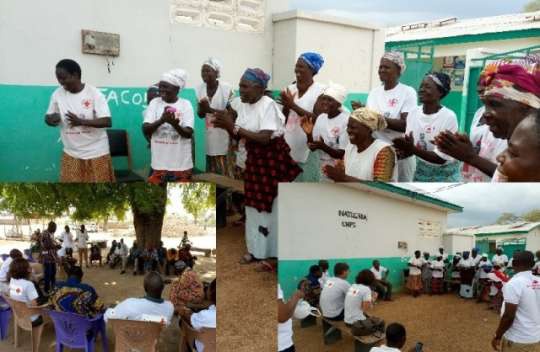The Ghana and Swiss Red Cross Societies in partnership with the Ghana Health Service (GHS) has initiated Mothers Clubs in four Districts of the Upper East Region to improve and promote the health status of pregnant women.
The 15,000 member Clubs spread across 80 communities within the Kassena-Nankana Municipal, Bongo, Nabdam and Binduri Districts were equipped with the requisite knowledge and logistics to educate expectant mothers on the importance of antenatal and postnatal care, exclusive breastfeeding and the need to seek early health care services and to deliver in health facilities.
Speaking to the Ghana News Agency after top management of the Red Cross Society (RCS) had visited some communities to assess the work of the Mothers Club, Mr Beat Von Däniken, the Director of International Cooperation of the RCS said the clubs were important because the CRS needed to reach out to rural areas that were not properly linked to the public healthcare system.
He explained that the Mothers Club was a volunteer-based activity that helped to improve on the health status of people within the poorest areas of the country, and said “the Ghana Red Cross Society had a wonderful programme with the Mothers Club.”
He said the Red Cross Societies in most countries depended on volunteers who were part of the communities and could play important roles to link the community members to healthcare facilities and added that Ghana was a stable country compared to other fragile and conflict countries and afforded volunteers comfort to operate freely.
Mr Samuel Kofi Addo, the Secretary General of the GRCS said it was incumbent for structures to be in place at the grassroots level to identify challenges related to maternal and child health and to enable them advice appropriately.
He said they were empowering the clubs with basic skills to identify signs and symptoms of common illnesses, adding that “these are our simple mothers we have empowered with knowledge so that they can pick up simple signs of diseases and offer basic first aid. When a person has diarrhoea, they should be able to prepare oral rehydration salt (ORS) for the person and help the person get to the nearest health facility.”

Mr Addo noted that the GRCS was auxiliary to government in delivering quality health care services to the people, “we can just back it up, but we cannot carry it as our main load,” he said, and further disclosed that the GRCS was liaising with the Swiss Red Cross to see how best they could partner with the GHS to address the transportation challenges in remote areas.
He said there were 11 tricycle ambulances on pilot bases, and they would later do an assessment to identify challenges to ensure smooth scale-up to reach more Districts because the feedback they got from the communities indicated that there was need for a scale-up.
Mr Addo indicated that Disaster Risk Reduction (DRR) was an area of concern to the GRCS apart from Maternal, Newborn and Child Health (MNCH) because the region was characterised by floods, rainstorms, bushfires among others.
The Secretary General said the RCS was in partnership with the National Disaster Management Organisation (NADMO) in that regard, and had engaged a consultant to identify the causes and outline the roles of stakeholders as part of its first step in disaster management.
When the team visited Natugnia, a community in the Kassena-Nankana Municipality to assess the activities of the Mothers Club, Naba Ambrose Anambono Asarh II, Divisional Chief of the area, expressed gratitude to the GRCS and said he was happy with their activities in his community.
He testified to the effect that the club had been of immerse support to expectant mothers in the community as they offered vital information and advised them concerning their health. He appealed to GRCS for means of transport to carry pregnant women, especially at night to health facilities for safe delivery.